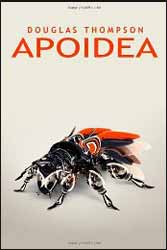|
Click here to return to the main site. Book Review
When the blight which has been affecting the bees finally culminates in their utter destruction, Gert Villers achieves that rare combination of roles as both the saviour of mankind and its richest citizen when he invents a robotic bee to pollinate the planet's plants. An idealist at heart, Gert is strongly against any militarisation of his machines, but his seemingly unassailable position of power turns out to be a façade when Del Freemont finds a way of hacking into the bees programming, stopping pollination and threatening global catastrophe. Accused, at the very least, of aiding this act Gert finds himself on the run from the authorities trying to do the right think in a collapsing world... Apoidea (223 pages) is the third novel from Douglas Thompson, published by Exaggerated Press. The title derives from the name of the super family which contains both wasps and bees. It is often inconceivable from the seemingly protected position of our technological towers that mankind’s existence could be so reliant on such small and insignificant creatures, which many an ice-cream eating tourist would consider as nothing more than a nuisance. The bee plays a vital role in plant propagation. No bees, no plant sex, and so no food. Thompson postulates a near future when man’s technology has turned back the tide of catastrophe one more time, with the invention of artificial bees. Individually, they have little in the way of intelligence; collectively they form a super hive mind which crosses the barrier into self-aware consciousness similar to the ants in Phase IV (1974). Del, a disgruntled ex-employee of Gert’s ability to seemingly take control of the bees is on many levels an act of self-deception. The collective intelligent hive mind demonstrates at various point of the book that it can transcend its programming to come to conclusions which suit its end rather than slavishly obey. Gert wrestles with the power which he presumes he has over the world’s food production and ultimately the survival of the species. In contrast Del, although espousing his green credentials, seems just as happy to exert his power, even if it means that millions will die of starvation. At one point in the book you do wonder who holds the real power, after all the bees only need the humans to solve a series of problems which will make them completely independent of their creators. In the end neither man has power over this new creation. Thompson attributes both a benign and caring aspect to the bees; they also wish to carry on their primary role, but they also demonstrate a machines ruthlessness, to the point where they kill a child without remorse. Thompson has created an intelligent speculative novel which provides an ecological thriller as a base upon which to discuss both the nature of power and its corrupting influence and the nature and meaning of freedom. Thompson balances the various requirements of the book well, there is only one section in the latter half of the book where the philosophising creates a hiccup in the flow of the underlying plot, but this is more of a minor deviation than a break. If you like your speculative fiction/science fiction to provide good entertainment as well as providing food for thought then you could do worse than check out Apoidea. 8 Charles Packer Buy this item online |
|---|


